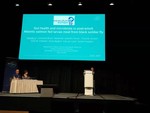Research Scientist
Guangdong Haid Group
Biography
I’m a Product Manager and Research Scientist at Thang Long Biotech, one of the leading aquafeed producers in Vietnam. In my role as Product Manager, I oversee the entire product life cycle—from market research and concept design to production and performance evaluation. At Thang Long, I manage feed portfolios for major carnivorous fish species farmed in Vietnam, including pompano, grouper, barramundi, snakehead, clown knife fish, swamp eel, and sturgeon. As a Research Scientist, I have led nutrient requirement and ingredient evaluation projects for barramundi and contributed extensively to studies on snakehead, clown knife fish, and Chinese bullfrog.
Interests
- Aquaculture
- Fish nutrition
- Gut health
- Microbiome
Education
PhD in Veterinary Science, 2015-2021
Norwegian University of Life Sciences
MSc in Aquaculture, 2012-2015
Ocean University of China
BSc in Aquaculture, 2008-2012
Fujian Agriculture and forestry University
